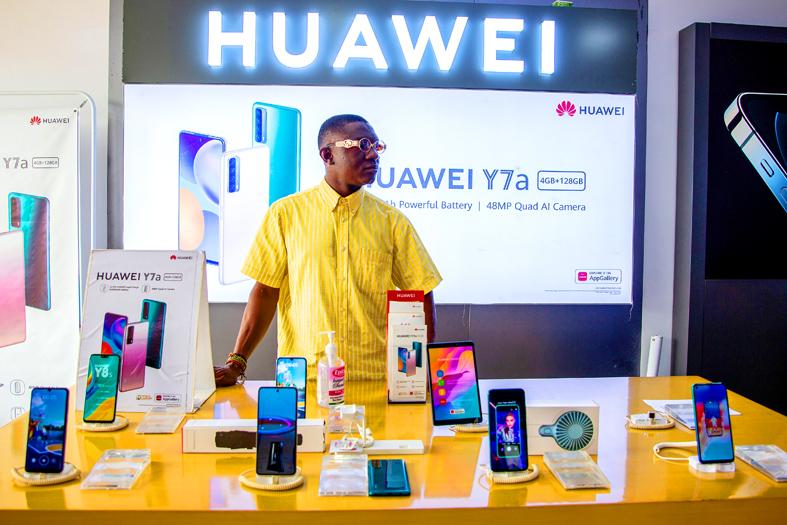US Federal Communications Commissioner Brendan Carr on Tuesday called for new steps to ensure Huawei Technologies Co (華為) and ZTE Corp (中興) equipment is barred from US telecommunications networks and ensure no electronic devices produced with forced labor enter the US.
The Federal Communications Commission (FCC) last year adopted rules requiring US telecoms to remove and replace equipment produced by Huawei or ZTE if purchased using an US$8.3 billion government fund, but carriers could still purchase equipment from the Chinese firms with private funds.
Carr called for closing the “glaring loophole.”

Photo: Bloomberg
“It makes no sense to allow that exact same equipment to get purchased and inserted into our communication network as long as federal dollars are not involved,” he said.
Huawei said in a statement that “extending the FCC’s evaluation and approval process to prohibit equipment that is already accredited by the FCC is misguided and costly to American companies.”
It said that blocking equipment based on where it was assembled is “discriminatory, and will do nothing to protect the integrity of US communications networks or supply chains.”
Carr also said that the FCC could do more to address China’s abuses of ethnic and religious minorities, especially against Muslim Uighurs in Xinjiang.
The commission’s equipment authorization rules should be updated to require companies that procure devices or components from Xinjiang “meet a heightened burden to ensure that their supply chain does not rely on any forced labor,” Carr said.
Acting FCC Chairwoman Jessica Rosenworcel “has long advocated for reforming the equipment authorization process to better ensure security in new network devices and is pleased to see growing support for this idea,” a commission spokesman said, adding that “the FCC is already working on addressing many of the issues Commissioner Carr spoke about.”
The FCC earlier last month designated five Chinese companies as threats to national security under a 2019 law aimed at protecting US communications networks: Huawei and ZTE, as well as Hytera Communications Corp (海能達通信), Hangzhou Hikvision Digital Technology Co (杭州海康威視數字技術) and Zhejiang Dahua Technology Co (浙江大華技術).
The FCC in December last year finalized rules requiring carriers with ZTE or Huawei equipment to “rip and replace” that equipment.
US lawmakers have approved US$1.9 billion to fund replacements.

With an approval rating of just two percent, Peruvian President Dina Boluarte might be the world’s most unpopular leader, according to pollsters. Protests greeted her rise to power 29 months ago, and have marked her entire term — joined by assorted scandals, investigations, controversies and a surge in gang violence. The 63-year-old is the target of a dozen probes, including for her alleged failure to declare gifts of luxury jewels and watches, a scandal inevitably dubbed “Rolexgate.” She is also under the microscope for a two-week undeclared absence for nose surgery — which she insists was medical, not cosmetic — and is

CAUTIOUS RECOVERY: While the manufacturing sector returned to growth amid the US-China trade truce, firms remain wary as uncertainty clouds the outlook, the CIER said The local manufacturing sector returned to expansion last month, as the official purchasing managers’ index (PMI) rose 2.1 points to 51.0, driven by a temporary easing in US-China trade tensions, the Chung-Hua Institution for Economic Research (CIER, 中華經濟研究院) said yesterday. The PMI gauges the health of the manufacturing industry, with readings above 50 indicating expansion and those below 50 signaling contraction. “Firms are not as pessimistic as they were in April, but they remain far from optimistic,” CIER president Lien Hsien-ming (連賢明) said at a news conference. The full impact of US tariff decisions is unlikely to become clear until later this month

GROWING CONCERN: Some senior Trump administration officials opposed the UAE expansion over fears that another TSMC project could jeopardize its US investment Taiwan Semiconductor Manufacturing Co (TSMC, 台積電) is evaluating building an advanced production facility in the United Arab Emirates (UAE) and has discussed the possibility with officials in US President Donald Trump’s administration, people familiar with the matter said, in a potentially major bet on the Middle East that would only come to fruition with Washington’s approval. The company has had multiple meetings in the past few months with US Special Envoy to the Middle East Steve Witkoff and officials from MGX, an influential investment vehicle overseen by the UAE president’s brother, the people said. The conversations are a continuation of talks that

CHIP DUTIES: TSMC said it voiced its concerns to Washington about tariffs, telling the US commerce department that it wants ‘fair treatment’ to protect its competitiveness Taiwan Semiconductor Manufacturing Co (TSMC, 台積電) yesterday reiterated robust business prospects for this year as strong artificial intelligence (AI) chip demand from Nvidia Corp and other customers would absorb the impacts of US tariffs. “The impact of tariffs would be indirect, as the custom tax is the importers’ responsibility, not the exporters,” TSMC chairman and chief executive officer C.C. Wei (魏哲家) said at the chipmaker’s annual shareholders’ meeting in Hsinchu City. TSMC’s business could be affected if people become reluctant to buy electronics due to inflated prices, Wei said. In addition, the chipmaker has voiced its concern to the US Department of Commerce